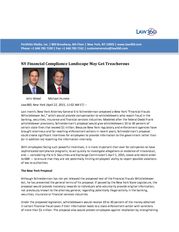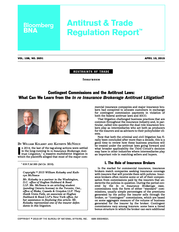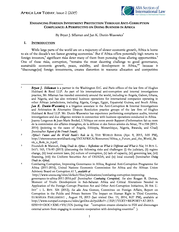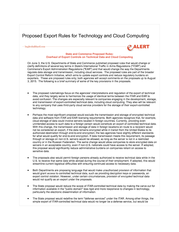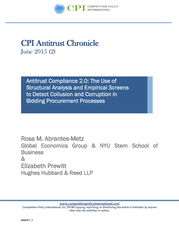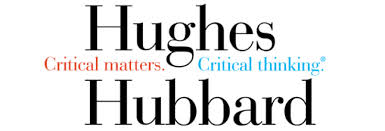Description
NYCLA opinion states that “[w] ile we do not believe
h
that attorneys are ethically obligated to review, monitor
and revise their LinkedIn sites on a daily or even weekly
basis, there is a duty to review social networking sites and
confirm their accuracy periodically, at reasonable intervals.”11 This requirement is another example that attorneys
can no longer glide by with an ignorance of what social
media is; once they set up profiles, they may need to actually monitor them in some way and keep track of what
people might be posting on their sites. Some may well
evaluate whether participation in too many forms of social
media is worth the effort.
Duty of Competence in Technological Matters
Times have changed in the practice of law, and many
governing bodies are now indicating that attorneys should
have some expectation or duty of competence as it relates
to technology. In 2012, the American Bar Association’s
(ABA) House of Delegates voted to amend Comment 8 to
Model Rule 1.1, which pertains to competence, to revise the
section that requires lawyers to “keep abreast of changes
in the law and its practice” to include keeping up with “the
benefits and risks associated with relevant technology.”
In January 2015, New York State adopted a version of
the ABA Comment that similarly imposes a duty to keep
abreast “of the benefits and risks associated with technology the lawyer uses to provide services to clients or to store
or transmit confidential information.”12
In addition, some ethics committees have directly
tied this duty of competence to the social media world. In
September 2014, the Pennsylvania Bar Association interpreted Rule 1.1 of the Model Rules of Professional Conduct to
require that lawyers have “a basic knowledge of how social
media websites work,” as well as the ability to advise clients
about the legal ramifications of using these sites.13 In June
2015, the updated Social Media Ethics Guidelines from the
Commercial and Federal Litigation Section of the New York
State Bar Association suggest that an attorney possess an
understanding, at a minimum, of the most basic functions of
how each system works, what information (particularly client
confidences) might be exposed, to whom and how, and the
ethical impact of the usage.14
The practice of law and the manner in which professionals and nonprofessionals alike function and communicate
have changed dramatically in recent years.
Understanding how social media and technology works and will impact one’s practice is becoming more of a necessity, both practically and as a matter of professional responsibility. Some large companies are now insisting on strict guidelines for communication protocols and protection of sensitive data, and a market for cyber insurance has even developed. Ethics rules and opinions have not yet opted to require specific measures such as encryption, but some ethics committees and bar associations are beginning to consider such measures. Good bankruptcy lawyers devote time to staying up to date with developments relevant to their chosen field, which now includes developments in the new and changing technologies that they use to interact with colleagues, adversaries and clients.
abi Editor’s Note: Stay connected with ABI on Facebook (facebook.abi.org), Twitter (twitter.abi.org) and LinkedIn (linkedin.abi.org). Reprinted with permission from the ABI Journal, Vol. XXXIV, No. 10, October 2015. The American Bankruptcy Institute is a multi-disciplinary, nonpartisan organization devoted to bankruptcy issues. ABI has more than 12,000 members, representing all facets of the insolvency field.
For more information, visit abi.org. 11 Id. 12 New York Rules of Professional Conduct, Rule 1.1, Comment 8. 13 Pennsylvania Bar Association, Formal Opinion 2014-300 (September 2014). 14 Social Media Ethics Guidelines, New York State Bar Association, Commercial and Federal Litigation Section (May 2015). 66 Canal Center Plaza, Suite 600 • Alexandria, VA 22314 • (703) 739-0800 • Fax (703) 739-1060 • www.abi.org .
Understanding how social media and technology works and will impact one’s practice is becoming more of a necessity, both practically and as a matter of professional responsibility. Some large companies are now insisting on strict guidelines for communication protocols and protection of sensitive data, and a market for cyber insurance has even developed. Ethics rules and opinions have not yet opted to require specific measures such as encryption, but some ethics committees and bar associations are beginning to consider such measures. Good bankruptcy lawyers devote time to staying up to date with developments relevant to their chosen field, which now includes developments in the new and changing technologies that they use to interact with colleagues, adversaries and clients.
abi Editor’s Note: Stay connected with ABI on Facebook (facebook.abi.org), Twitter (twitter.abi.org) and LinkedIn (linkedin.abi.org). Reprinted with permission from the ABI Journal, Vol. XXXIV, No. 10, October 2015. The American Bankruptcy Institute is a multi-disciplinary, nonpartisan organization devoted to bankruptcy issues. ABI has more than 12,000 members, representing all facets of the insolvency field.
For more information, visit abi.org. 11 Id. 12 New York Rules of Professional Conduct, Rule 1.1, Comment 8. 13 Pennsylvania Bar Association, Formal Opinion 2014-300 (September 2014). 14 Social Media Ethics Guidelines, New York State Bar Association, Commercial and Federal Litigation Section (May 2015). 66 Canal Center Plaza, Suite 600 • Alexandria, VA 22314 • (703) 739-0800 • Fax (703) 739-1060 • www.abi.org .

